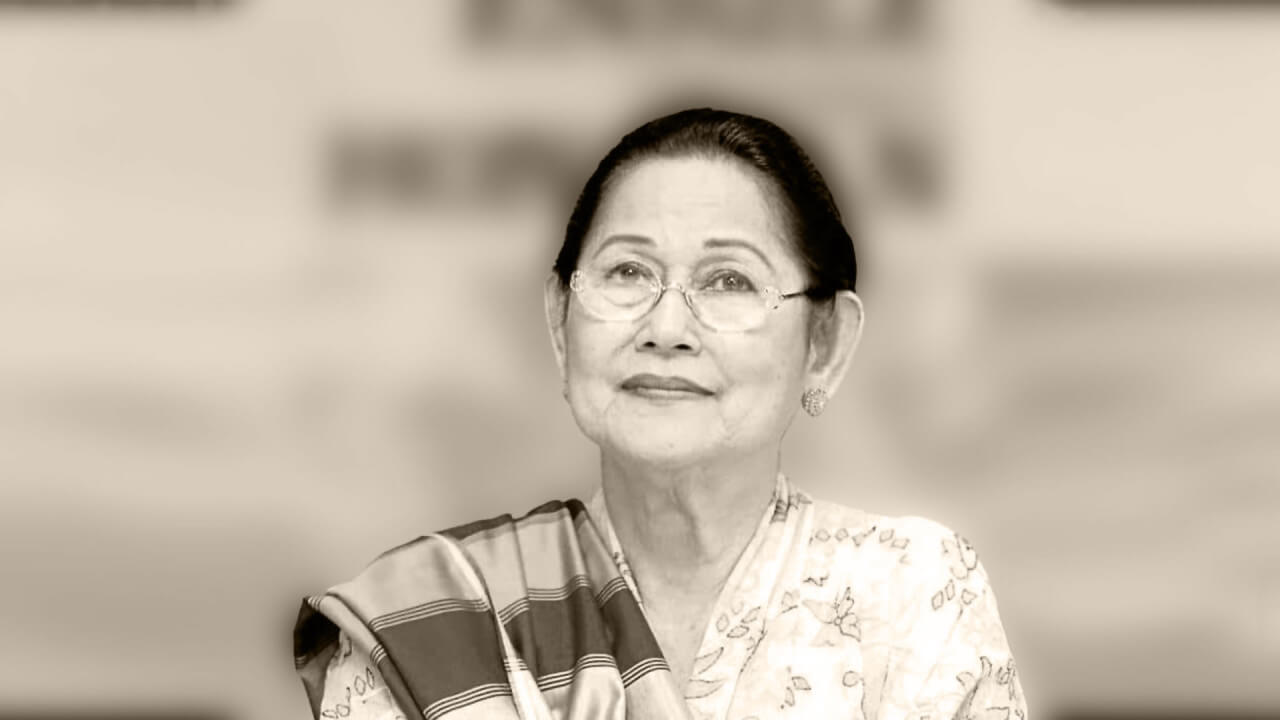

Senator Rasul was born on Sept. 14, 1930 in Siasi, Sulu at a time when Christians and Muslims could freely and peacefully co-exist.
With a background that has been described as “coming from an elite family and political dynasty in Sulu Province, Mindanao” and “old aristocracy,” family lore states that her father, Miralam Tillah, came from a line of Indian seafarers while her mother descended from a wealthy Chinese clan. She was one of nine siblings.
From Tawi-Tawi to Diliman
Rasul graduated valedictorian at Laum, Tabawan Elementary School in South Ubian, Tawi-Tawi, in 1941, and first honor at Sulu High School in Jojo, Sulu in 1948.
She was part of the first batch of University of the Philippines (UP) students to enroll in Diliman, making history as the first and only Muslim woman at that time to enter the state university. She graduated cum laude with a degree in Political Science in 1952. The following year, at the age of 23, she married Abraham Rasul, her college partner who would later serve as Philippine ambassador to Saudi Arabia.
A voracious reader, Rasul dreamed of being a lawyer, and was offered a scholarship to take up graduate studies in France. But life took a different turn. Recounts her daughter Amina Rasul-Bernardo:
“But her father said: Umuwi ka na sa probinsya at magkaroon ka na ng pamilya.’Yung pag-aaral ng law ibigay mo na lang sa kapatid mong lalaki (Go back to the province and start a family. Let your brother pursue law studies instead)."
Still, she would acquire her master's degree in National Security Administration from the National Defense College of the Philippines in 1976 and doctoral units in Public Administration at the University of the Philippines in 1978.
Upon returning to Sulu, she became a public school teacher from 1952 to 1957, where among her grade three students was future Moro National Liberation Front (MNLF) founder Nur Misuari. From there, she served as technical assistant to the Office of the President of the Philippines from 1963 to 1964.
Entering political life
Rasul first got a taste of politics when she was elected barrio councilor at Moore Avenue, Jolo, Sulu, for two terms from 1960 to 1961 and from 1962 to 1963. From 1971 to 1976, she was elected member of the Provincial Board of Sulu and became the commissioner representing Muslim and other ethnic minorities from 1978 to 1987. In 1986, she became a member of the Board at the Ministry of Education, Culture and Sports.
First female Muslim Senator
In 1987, Rasul became the first female Muslim Senator where she served until 1992 and was again reelected for a second term until 1995. During her senatorial stint, she was committed to advancing civil service and education reforms, promoting women’s and minority rights, and fostering peace in her hometown.
In terms of legislative agenda, her legacy includes Republic Act 8650 that grants civil service eligibility to government employees who have worked in a career service position for at least seven years, and R.A. 7192 which dismantled gender discrimination and thus opening the doors of the Philippine Military Academy (PMA) to women as well as allocating funds for women in all government agencies. She also played a key role in the declaration of March 8 as National Women’s Day.
Speaking on women empowerment as senator before a group of female lawyers, Rasul said:
“Empowerment to my mind means allowing and encouraging meaningful participation of women in development. This, in turn, entails the building up and harnessing the vast potential and capabilities of women, whether individually or a group, to enhance their social, economic, and political role in society.”
“Empowerment for women, it must be emphasized, does not mean domination but rather the capability to exercise choices and control over decisions that affect their lives.”
Life after the Senate
On the issue of the Treaty of Friendship, Cooperation and Security between the Republic of the Philippines and the United States which would have extended the presence of US bases in the country, Rasul registered an affirmative vote for ratification with reservations, citing economic considerations.
After leaving the Senate, Rasul resumed her advocacy of fighting illiteracy among Muslim adults, which was first drawn to her attention by the late Rafael Salas, through the Magbassa Kita Foundation (Let Us Read), a program she spearheaded to uplift communities through literacy. In 2001 she tried but failed to seek a senate seat under the LDP-Pwersa ng Masa ticket.
“She excelled in everything she put her mind to--civil servant, champion of Muslim and women’s rights, teacher--” writes Ibba Rasul Bernardo, a grandson. “But to me, where she truly shined was as my grandma.”
She is survived by her children Amina, Fatima, Amroussi, Abraham Jr., Yusuf, and Salma Pir. Her husband predeceased her in 2002.

Features Reporter